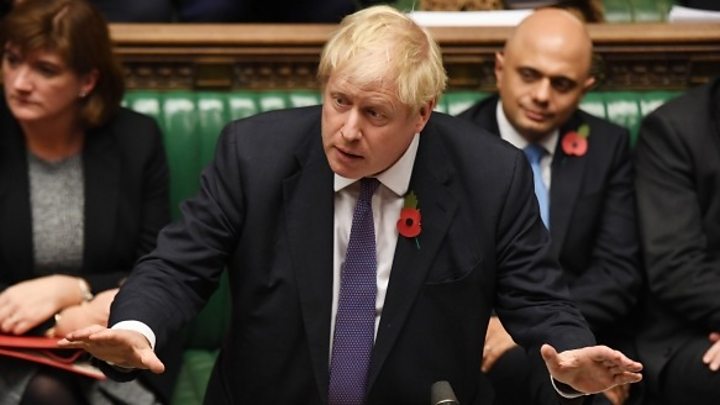
Boris Johnson will try for a fourth time to secure an early general election, after MPs rejected his plan.
The PM will now ask MPs to approve a 12 December election through a one-page bill – which needs the support of fewer MPs than his last attempt.
But No 10 sources say they would accept an election on 11 December to get opposition parties on-board.
Mr Johnson said the “paralysis” could not go on, but Labour said a no-deal Brexit had to be taken off the table.
It follows the agreement by EU leaders to delay Brexit until 31 January.
The Commons backed the government’s election motion by 299 to 70 on Monday – but it was well short of the two-thirds of all 650 MPs whose support are needed to call an election under the Fixed-term Parliaments Act.
All Conservative MPs backed the motion, but the vast majority of Labour MPs abstained, along with the SNP and DUP. All but one MP from the Liberal Democrats voted against it.
The government has now said it will abandon its attempt to pass its Brexit bill, for the time being.
Instead, it has published its Early Parliamentary General Election Bill, which allows for an early election to take place on 12 December.
Former Chancellor Philip Hammond – who lost the Conservative whip after voting against a no-deal Brexit – said the idea of using “precious time” to hold an election, rather than passing the government’s Brexit bill, “frankly appals me”.
But Home Office Minister Brandon Lewis said: “We have to have an election to deliver a Parliament that can get Brexit through.”
Labour’s shadow cabinet are meeting to discuss their position on the bill.
Benefits of EU extension
The vote came after Mr Johnson officially accepted the EU’s offer of an extension to the Brexit deadline to 31 January.
This means the UK will not now leave the EU on Thursday – 31 October – a promise at the heart of Mr Johnson’s campaign to become prime minister.
In a letter to EU officials, Mr Johnson said the further delay – which he insists was forced upon him by Parliament – was “unwanted”.
Mr Johnson said he would persist with his efforts to get an early election, telling MPs that “one way or another” the current deadlock had to be broken.
MPs will begin to debate and vote on a bill for a 12 December election – at least its second reading – on Tuesday lunchtime.
Jacob Rees-Mogg, Leader of the House of Commons, said the government wanted MPs to debate all stages of the bill in a day.
Usually a bill is debated over the course of several days, but Mr Rees-Mogg said the legislation would be “extremely short, simple, and limited in scope”.
The bill has to pass through the House of Commons and the House of Lords before it can come into effect.
Mr Rees-Mogg added that the government would not bring its Withdrawal Agreement Bill back to MPs for scrutiny, as would be required for Mr Johnson’s Brexit deal to become law.